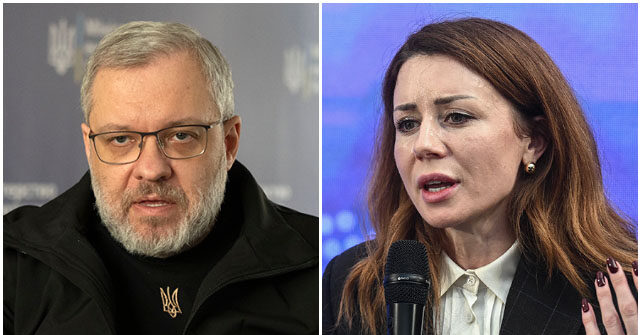The justice and energy ministers of Ukraine resigned on Wednesday, the latest officials to be toppled by a fast-growing corruption scandal involving the energy industry.
The scandal has enraged Ukrainians weary from years of war against Russia and threatens to block Ukraine’s effort to join the European Union.
Justice Minister Herman Haluschenko and Energy Minister Svitlana Grynchuk resigned on Wednesday within hours of President Volodymyr Zelensky calling for them to step down. Both insisted they were not guilty of any wrongdoing.
Haluschenko was the energy minister before he became justice minister. He is one of many high-level officials implicated by Operation Midas, a probe launched in the summer of 2024 by the National Anti-Corruption Bureau of Ukraine (NABU) and the Special Anti-Corruption Prosecutor’s Office (SAP).
The evidence accumulated by the probe includes piles of cash, a vast trove of documents seized in over 70 raids across the country, and over 1,000 hours of wiretap recordings. NABU said “almost the entire staff of detectives” employed by the agency was involved in the final stages of the investigation.
NABU said Operation Midas exposed a bribery and kickback ring so huge that it would qualify as one of the largest corporations in Ukraine, if it had been legal – a money-laundering enterprise that handled over $100 million.
The core of that enterprise was allegedly a kickback scheme in which contractors paid off politicians to secure lucrative contracts from state nuclear power company Energoatom for building fortifications to protect Ukraine’s energy infrastructure from Russian attacks. Many of those energy facilities ended up getting destroyed by Russian bombs, saddling Ukrainian citizens with dangerous blackouts during the frigid winter months. The kickbacks alleged ranged as high as 15 percent of the value of the contract.
The alleged ringleader of the scheme was Tymur Mindich, co-owner of a popular comedy troupe and production company called Kvartal 95.
The studio’s most successful production was a 2015 sitcom called Servant of the People, a zany comedy about an ordinary schlub who suddenly finds himself becoming the president of Ukraine after he posts an online rant about corruption. The star of that show was Volodymyr Zelensky, who is also a co-owner of Kvartal 95.
Mindich was also a business partner of Ihor Kolomoyskiy, the billionaire who bankrolled Zelensky’s successful presidential campaign in 2019. Kolomoyskiy was arrested and jailed in 2023 on charges of fraud and money laundering.
Mindich somehow managed to leave Ukraine a few hours before the police searched his home on Monday, which added another dimension to the scandal, since leaving Ukraine on short notice is virtually impossible under wartime restrictions. Ukrainian media outlets have been speculating that Mindich was tipped off about the raid and fled to Israel.
Several other current and former high-ranking officials in Zelensky’s government have been implicated by Operation Midas, including National Security and Defense Council secretary Rustem Umerov, former deputy prime minister Oleksiy Chernyshov, former head of Energoatom security Dmytro Basov, and Ihor Myroniuk, former deputy chief of the State Property Fund. NABU has yet to publicly identify most of the suspects in the case.
NABU and SAP are also running a separate probe over kickbacks in military procurement contracts, in which low-quality equipment was purchased for outrageously high prices. Chinese-made bulletproof vests were an example state prosecutors provided. The government paid far more than the vests were worth and a portion of the illicit profit was kicked back to the officials who arranged the purchase.
The wiretaps collected by anti-corruption investigators included conversations in which the suspects discussed their kickback scheme using pseudonyms. Former deputy prime minister Chernyshov, for example, was known as “Che Guevara.” In one of the recordings, “Che Guevara” talked about sending his wife to pick up a $500,000 kickback payment.
Court hearings live-streamed by Ukrainian public television on Thursday included the first wiretapped conversation that mentioned Zelensky by name – a clip in which Mindich boasted to Galushchenko about how much influence he had over the president.
Even if he is not directly implicated any further, the scandal could prove devastating to Zelensky for several reasons, including lingering public anger over his effort to weaken NABU and SAP by bringing them directly under presidential control in July. Zelensky’s decree was reversed by the legislature after weeks of massive protests.
Those protesters will doubtless feel vindicated today, and Zelensky might feel some pressure to prove that his takeover effort in July was not meant to crush the embarrassing Operation Midas.
The scandal could also thwart Zelensky’s effort to join the European Union (EU), which has frequently warned that Ukraine must make progress against corruption before membership would be considered. Just last week, the EU applauded the progress Ukraine has made thus far, but said more work was needed.
German Chancellor Friedrich Merz expressed Europe’s concerns to Zelensky in a phone call on Thursday, stressing “the German government’s expectation that Ukraine press ahead energetically with fighting corruption and further reforms, particularly in the area of the rule of law.”
Zelensky promised Merz “full transparency, long-term support for the independent anti-corruption authorities and quick further measures in order to win back the confidence of the Ukrainian population, European partners and international donors.”
European Commission spokesman Guillaume Mercier optimistically described the Operation Midas revelations as proof that “anti-corruption bodies are in place and functioning in Ukraine.”
“Let me stress that the fight against corruption is key for a country to join the EU. It requires continuous efforts to guarantee a strong capacity to combat corruption and a respect for the rule of law,” Mercier said.
European Commission President Ursula von der Leyen doubled down on Ukraine by announcing a new $7 billion loan to Kyiv on Thursday, with a promise to “cover the financial needs of Ukraine for the next two years.”
Von der Leyen stressed the importance of showing Russian President Vladimir Putin that he cannot “outlast” Ukraine.
The breaking news from Ukraine will not play well in the United States, where skepticism about pouring money into Ukraine to help it stave off the Russian invasion has been steadily growing. The military procurement and power-plant defense angles of the scandal are sure to be discussed in Washington.


















